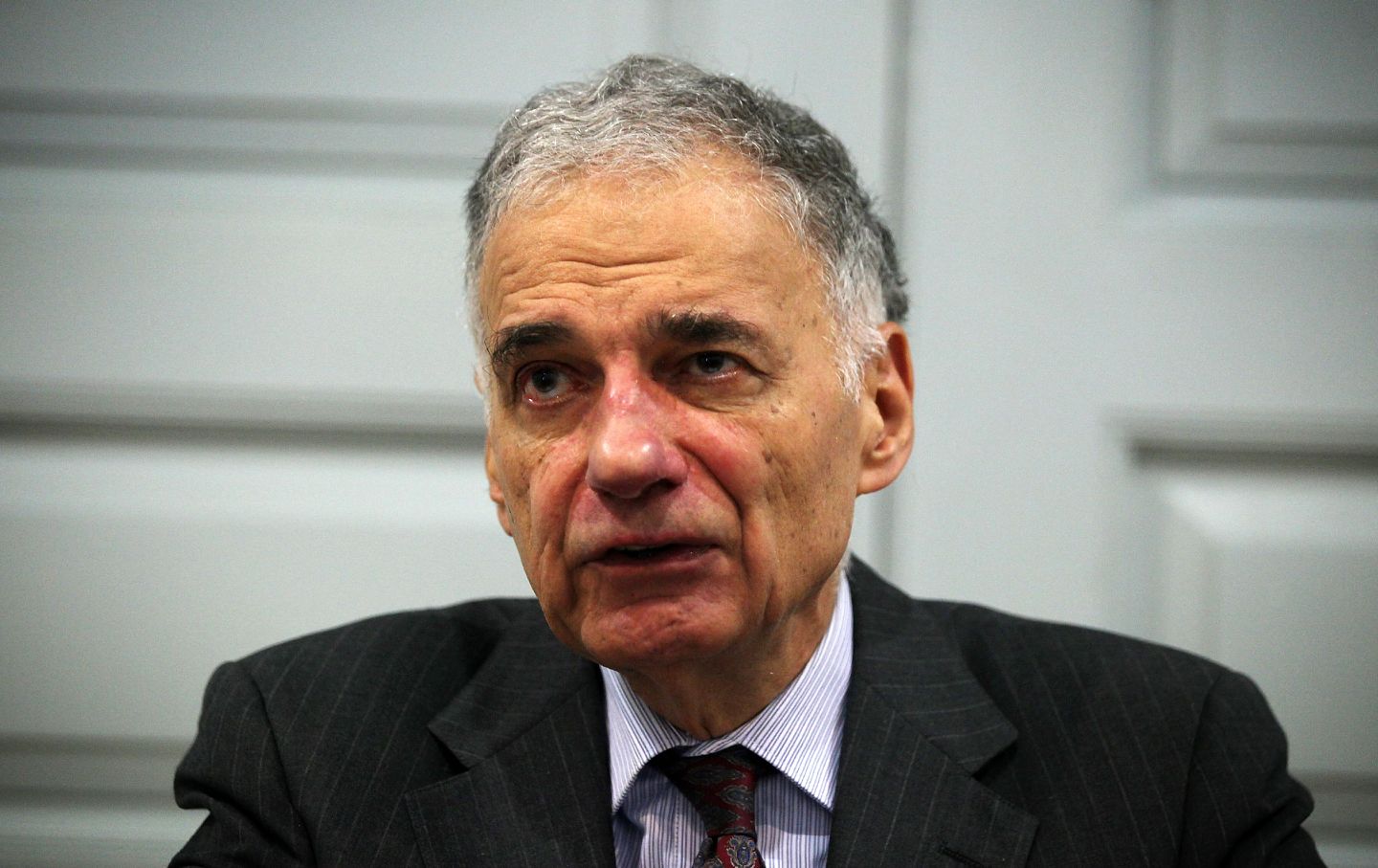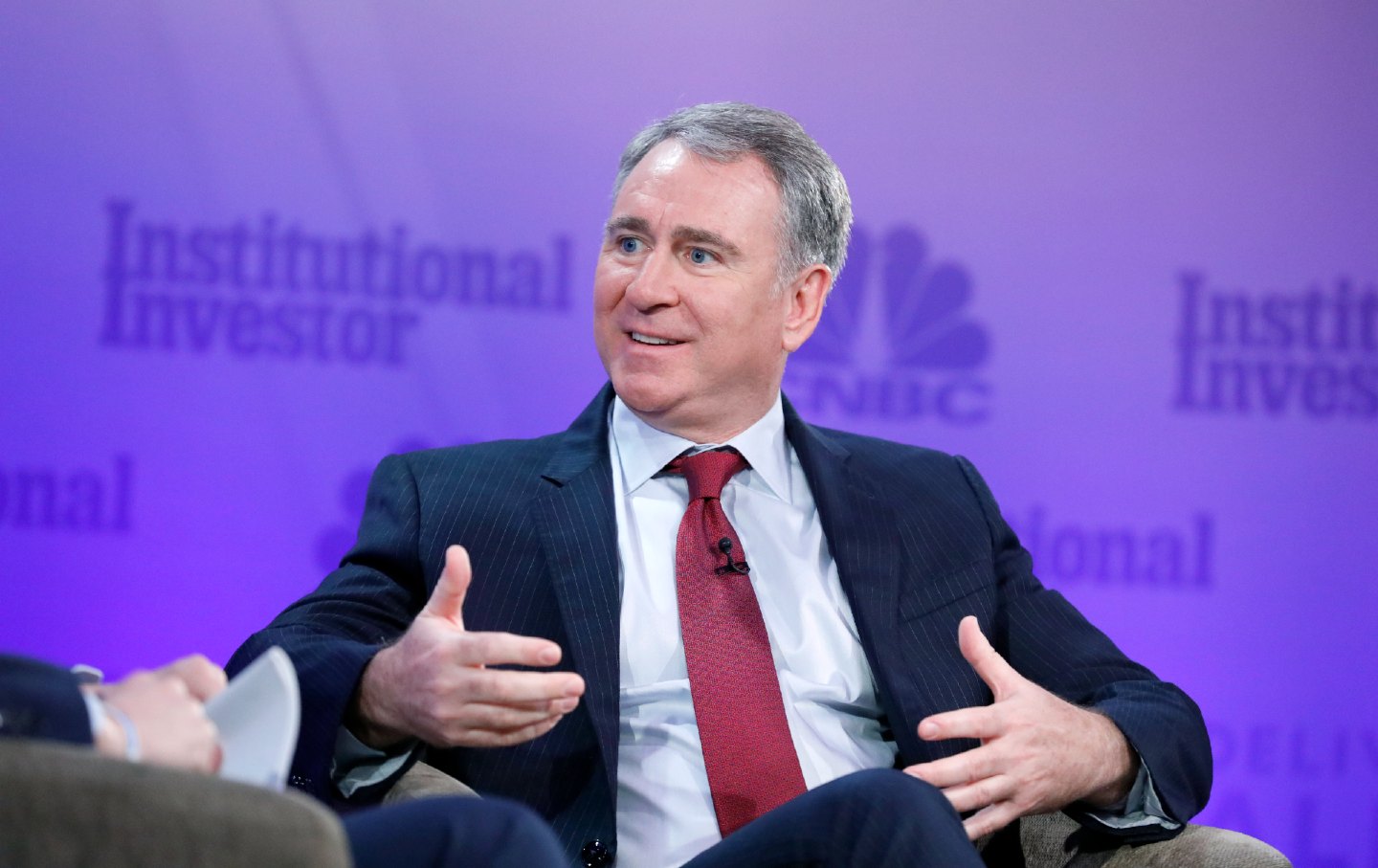Meet Ralph Nader’s Rebellious CEOs
Can business legitimately earn its social license in a time of crisis?

Ralph Nader, who will turn 90 in February, lives modestly in Washington, D.C., and in his hometown of Winsted, Conn., across the street from relatives. He has never spent a lot of money on his suits, has never owned a car. He uses, or recently used, a typewriter, not a computer. He never formed a family because by his own account he wanted to concentrate on his career. For 60 years, he has been an indefatigable gadfly biting the underside of corporate capitalism’s twitching horsetail. He is also an alumnus of elite institutions (Harvard and Princeton), has been famous since youth, and ran for president three times. You can find on YouTube his first appearance on Johnny Carson’s show and as the uncomfortable honoree of a Dean Martin–hosted roast. He is by the usual standards, a success: known for being known, has made money, and lived on his own terms.
But Nader is more than a distinctly American success. His work, including his most recent book, published last November, The Rebellious CEO: 12 Leaders Who Did It Right, reflects a buoyancy, persistence, and fortitude that over six decades has annealed into a daily habit of courage. He has long since evolved from being a consumer advocate, indeed the inventor of consumer advocacy, into a defender of the common good, picking up new enemies along the way. Non-rebellious CEOs never liked him; nor did Republican senators. He has been anathema to former allies on the left since he and lesser-known third-party candidates drew off enough votes to allow Bush to squeak by Gore in Florida. Although he shares the progressive distaste for the ways in which corporate leaders privilege their wealth and protective space over human rights, community welfare, and ecological sanity, Nader says he never identified as a liberal, describing himself instead as a “moral empiricist,” a name tag he could share with American iconoclasts like Ralph Waldo Emerson, William James, and John Dewey, who preferred the lean-to of lived experience to any house built brick by brick as a system—whether Marxist, utilitarian, or religiously dogmatic.
Nader’s 12 rebellious CEOs are also all successful in the American grain (though none as famous as Nader, all were or are well-known in their own circles, made money and lived, unlike most CEOs but like many entrepreneurs, on terms of their own choosing). They are moral empiricists as well, sharing a disdain for corporate stage fog. John Bogle created Vanguard, an investor-owned asset management fund that upended its industry by pushing index funds and minimizing fees. Nader quotes Anita Roddick of the Body Shop: “I hate the beauty business. It is a monster industry selling unattainable dreams. It lies. It cheats. It exploits women.” Bernard Rapoport, CEO of the American Income Life Insurance Company, when confronted by Ronnie Dugger, editor of the Texas Observer, with the fact that life insurance is just an actuarial calculation and “ought to be nationalized,” promptly agreed with him. He then became a prominent advertiser to help keep the Observer afloat (and, as Nader writes, “sell some policies along the way”). Robert Townsend, while trying hard to turn Avis’s business from red to black, “abolished reserved parking spaces, organization charts, job descriptions, groveling to demanding, short-term Wall Street analysis, company planes, golf club memberships, long meetings or long conference calls, the P.R. Department, Personnel Department, and loads of vice presidents for this and that,” which, sadly, sounds just as refreshing now as it did then.
The CEOs Nader sketches paid their employees well. Jeno Paulucci, a miner’s son, founded 70 companies he built to sell and gave generously to causes along the way. Others, born into privilege and working as managers, bucked their boards to support causes or treat their employees, suppliers, and customers well. The brilliant Gordon Sherman, who created the franchise model for Midas Muffler, bucked his father and lost. Herb Kelleher built Southwest Airlines on low fares, good-humored customer service, and shrewd legal and logistical maneuvering. Nader’s rebels didn’t grouse about regulations and often did better than comply.
In his introduction, Nader divides his rebellious dozen into “mavericks” and “visionaries,” citing Roddick and Yvon Chouinard as exemplars of the latter. They, with Ray Anderson of Interface, the carpet company, are the three whose vision changed the way they did business in a way others could follow. Each sought to do positive social good and minimize environmental damage in their business operations and sourcing. Anderson experienced an epiphany upon reading Paul Hawken’s Ecology of Commerce,the most visionary book written by any of the 12, though Smith & Hawken itself as a business was not remarkable in its departures from convention. Interface changed the way carpets could be made and radically reduced the industry’s environmental impact and waste stream. Roddick’s Body Shop stores, in window displays and through conversations between floor staff and customers, brought a social activism to business that influenced campaigns by, among others, Benetton, Esprit, and Levi’s. Patagonia‘s environmental advocacy and grantmaking and collaborative work with its supply chain to reduce its impact has been consistently strong for decades. (Disclaimer here: I am Chouinard’s nephew and one of Patagonia’s original employees; more later.)
The Rebellious CEO confers the benefit of the writer’s acquaintance or friendship with the leaders he profiles. As a whole, the 12 sketches contraindicate the Milton Friedman prescription of shareholder primacy as the sole purpose of a business or condition for its success. I can attest to the quality, depth, and specificity of Nader’s research into Patagonia and appreciate the enthusiasm for Yvon Chouinard and what he has done. Note, though, that Yvon has never titled himself CEO (though he is unquestionably Patagonia’s moral leader). And although Chouinard well deserves the recognition he has received, much of what we have been able to do so far as an enterprise results from a work culture that places on itself environmental and social constraints on itself, which in turn spurs innovation in search of what should, and can, be done.
If a strength of the book is Nader’s tangible, infectious, and clear love and regard for his renegade subjects, it suffers from too much of a top-down view and too many moments of unreflective appreciation of size, volume, and growth as the measure of excellence, especially from so steadfast a critic of outsize corporate power that attends large enterprise. Only one of Nader’s profiled leaders, Andy Shallal of Poets and Busboys, a regional chain of restaurants and event spaces, runs a business of less than national scale. Yet small business employs more people by far than billion-dollar companies. The book’s US focus excludes mention of two of the most interesting recent CEOs of big companies—Emmanuel Faber of Danone and Paul Polman of Unilever—who recognized the severity of the twinned environmental and social crisis and worked hard to change their organizations and the packaged-food industry to do more good and less harm. Both have moved on, Faber fired by an “activist” board; Polman has retired.
The book should be read as memoir and social history, not as a view of the contemporary state of rebellion. Nine of the 12 leaders Nader profiles are no longer alive, and only three have been active in business during this century. As our twinned crisis grows more serious, the social license for business legitimacy grows more costly. Vanguard was innovative in its day. It is still owned by its member funds and charges low fees (and is second in size only to Blackrock as an asset manager) but index funds do not solve the problem of the stock market as casino or help generate reasonably profitable investments that strengthen local communities or reduce the adverse environmental impact of industry. I had to do a double take reading that B. Rapoport, on the basis of his admirable support for unions in an industry that abjured them, built a substantial, competition-free business selling supplementary life insurance to union members. This despite Rapoport’s agreement with Ronnie Dugger that life insurance, built on an actuarial calculation, “ought to be nationalized.”
Aldo Leopold wrote that a “thing is right when it tends to support the integrity, stability, and beauty of the biotic community,” meaning all of life including humans. Yet the business we have done for our living over the past 200 years—and accelerated in the past 50—tends to undermine the integrity, stability, and beauty of the world. Our relative mastery of nature has revealed itself now as a snake eating its own tail. The task ahead is to do work that meets our needs and lets us—and the rest of life—breathe.
This is the only way business can legitimately earn its social license in a time of crisis. Business has a role to play. Businesses are, or should be, self-supporting enterprises that require neither tax money nor the largesse of the rich to survive. And if a company or industry doesn’t care to be useful, it must at least clean up after itself, not leave it to the rest of us to deal with the mess and pay the bill. Ralph Nader, eyeing business through his moral empiricist’s eye for decades, knows its leaders’ temptations and shortcomings old and new. Reading him is like listening to a wise elder of any era who knows the sins of his age and can name contemporaries who resisted the temptations of greed and passivity, who came through without coming up short. Nader does this; we’re lucky to have his stories, told in his benign, insistent voice.








